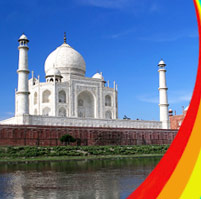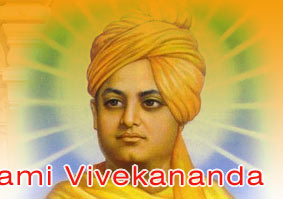It is Swami Vivekananda who can be attributed the credit for laying the foundation for the establishment of Ramakrishna mission and math that are actively involved in carrying out philanthropic works. The national day that is celebrated on the 12th of January every year is dedicated to Swami Vivekananda, as it is on this day that this impressive personality was born. His influence led to the introduction of Vedanta philosophy in America and England.
 His efforts were acknowledged even by the noted Indian leaders such as
Mahatma Gandhi and Subhash Chandra Bose. Subhash Chandra Bose called him
"the maker of modern India". According to Gandhiji, it was the
influence of Swami Vivekananda that his love for his country increased
thousand fold. He deserves a major credit for giving the nation a modern
vision. His influence led to the introduction of Vedanta philosophy in
America and England. Read on to know the complete story of Swami
Vivekanand.
His efforts were acknowledged even by the noted Indian leaders such as
Mahatma Gandhi and Subhash Chandra Bose. Subhash Chandra Bose called him
"the maker of modern India". According to Gandhiji, it was the
influence of Swami Vivekananda that his love for his country increased
thousand fold. He deserves a major credit for giving the nation a modern
vision. His influence led to the introduction of Vedanta philosophy in
America and England. Read on to know the complete story of Swami
Vivekanand.Life
Before turning into a monastic, Vivekananda was called by the name Narendranath Dutta. He was born as the son of Viswanath Dutta & Bhuvaneswari Devi on the January 12, 1863 in Shimla Pally, Kolkata, West Bengal. This precocious child started meditating at a very early age. Even as a child, he was an all rounder. He was outstanding at studies, games and other extra curricular activities. In the year 1879, he joined the Presidency College for pursuing higher studies. After one year, he learnt philosophy from the Scottish Church College, Calcutta. It was in this college that he got to know about Sri Ramakrishna of Dakshineswar.
Ramakrishna Mission
The Rama Krishna mission was founded by Swami Vivekananda, the chief disciple of Sri Ramakrishna Paramhansa on the 1st of May in the year 1897. The Vivekananda Ramakrishna mission is actively involved in the missionary as well as altruistic works such as disaster relief. The disciples that are serving the mission consist of both monastic and householder. Its headquarters are based near Kolkata, India. More…
Philosophy
Swami Vivekananda was a great social reformer and a very inspiring personality. He was the pride of India. He made an immense contribution to purify the souls of people. He always said that God dwells inside every heart. He was of the opinion that, a person who cannot see God in poor and unhealthy people, but claims to see God in the idol, is not a true worshipper. More…
Vivekananda Works
He compiled a number of books on the four Yogas, namely Raja Yoga, Karma Yoga, Bhakti Yoga and Jnana Yoga. His best literary works include the letters written by him, which have a lot of spiritual value. He maintained a very simple style of writing, so that the laymen, for whom the message is meant, are able to understand his each and every word. He was not just actively involved in writing, but also was a great singer and composed several songs.
On July 4, 1902, at a young age of 39, this great man headed his way for heaven.










